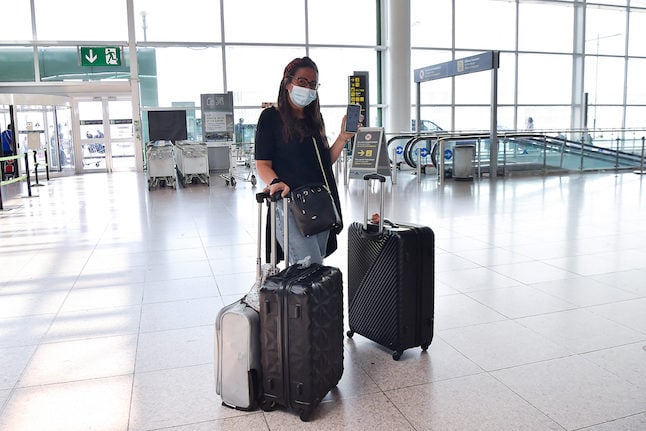The answer is yes, Spain will accept the NHS Covid Pass for entry into the country.
The UK government website states: “Spain will accept the UK’s solutions to demonstrate your COVID vaccination status”. While the Spanish government website says they will allow: “Persons with a vaccination certificate, that the Ministry of Health recognises for this purpose, after verification by the health authorities, as well as their accompanying minors (under 12 years of age)”.
What is the NHS Covid Pass and how do I get it?
The UK government website says that “The NHS COVID Pass lets you share your coronavirus (COVID-19) vaccination records or test COVID-19 status in a secure way. It allows you to show others the details of your COVID-19 vaccine (or vaccines) when travelling abroad to some countries or territories”.
You can obtain your NHS COVID Pass after receiving either two doses of the Moderna, AstraZeneca or Pfizer vaccines or one dose of the Johnson & Johnson (Janssen) vaccine.
The only requirement, according to the UK government, is that you must have been vaccinated in England.
You can usually obtain your NHS COVID Pass within 24 hours of having your vaccination. However, it can take up to five days for your records to be updated.
Be aware that the NHS Covid Pass is not the same as the physical vaccination card you received when you got your Covid-19 jabs, the pass for travel must be downloaded from the official NHS App.
You can access the NHS COVID Pass through the free NHS App. You need to be registered with a GP in England to use the app.
You will see two barcodes within the NHS App: one barcode per vaccine. If you print a PDF of your COVID Pass status, your printed copy will show two barcodes. This can be used for travel, either in digital or paper form.
Please note that the NHS App is not the same as the NHS COVID-19 tracing app.
READ ALSO – REMINDER: Everything Brits need to know about travel to Spain under new rules in July 2021
What if I’m not registered with a GP or the app is not working?
According to the UK government website if you’re not registered with a GP, you can still access the NHS COVID Pass via the NHS website or by calling 119 to request a letter instead.

What if I’m travelling to Spain from Scotland, Wales or Northern Ireland?
If you are travelling from Scotland and received your Covid-19 jabs there, you will not be able to use the NHS Covid Pass, however, if you are fully vaccinated, you can still get proof of this to travel to Spain. The Scottish government has confirmed that its Covid vaccine certificate is valid for travel to Spain.
The Scottish NHS website says “You can request a printed copy of your vaccination status online or by phoning the COVID-19 Status Helpline. Letters will be sent by first class post and should arrive within 14 days”.
You can also view and request to print your vaccination status online by logging in using your unique username and password. These can be found on your Covid-19 vaccination appointment letter.
According to the Welsh government website, people in Wales cannot currently use the NHS app to access their NHS COVID Pass and vaccination status. Instead, you can get your vaccination status in paper format if two weeks have passed since you completed a full course of the COVID-19 vaccine.
Can I travel to Spain as soon as I’ve been fully vaccinated?
Even though you can download your NHS Covid Pass within 24 hours of your vaccination, it will not actually serve you for travel to Spain until at least 14 days afterward.
You will be allowed to enter Spain when you can show proof of being fully vaccinated at least 14 days prior to arrival in Spain with a vaccine authorised by the European Medicines Agency or by the World Health Organisation.
All documents must specify the name and surname of the passenger and you need to make sure that the name on your NHS Covid Pass matches the name on your passport, if not, you will need to contact your GP to get this rectified as it may not be valid for entry into Spain.
Why does my NHS Covid Pass show it’s only valid for one month?
Many people have been reporting that when they log on to the NHS app and download their pass, it has an expiry date on it. What happens if the expiry date is before you travel to Spain?
According to the UK government website “The printed copy is valid until its expiry date”.
Several people on Twitter have said they have gotten around this by logging back into the app at a later date and downloading another NHS Covid Pass with a different expiry date, further in the future.
I am not fully vaccinated yet, can I still travel to Spain?
Yes, even if you’re not fully vaccinated yet and cannot get your NHS Covid Pass, you can still travel from the UK to Spain by showing a negative Covid-19 test.
According to the Spanish government website, they will accept diagnostic certificates of NAAT tests (nucleic acid amplification tests, e.g.: RT-PCR, RT-LAMP, TMA, HAD, NEAR, CRISPR & SDA).
- Please be aware, that in addition to any Covid passes, certificates or negative tests, Spain also requires all travellers to fill out a health control form before they arrive.
READ ALSO: Can I travel to Spain if I’ve only had one dose of the Covid-19 vaccine?



 Please whitelist us to continue reading.
Please whitelist us to continue reading.
Has anything changed regarding EU pass /fully vaccinated ,being accepted for Ex pats wanting to travel from Germany to Scotland ?